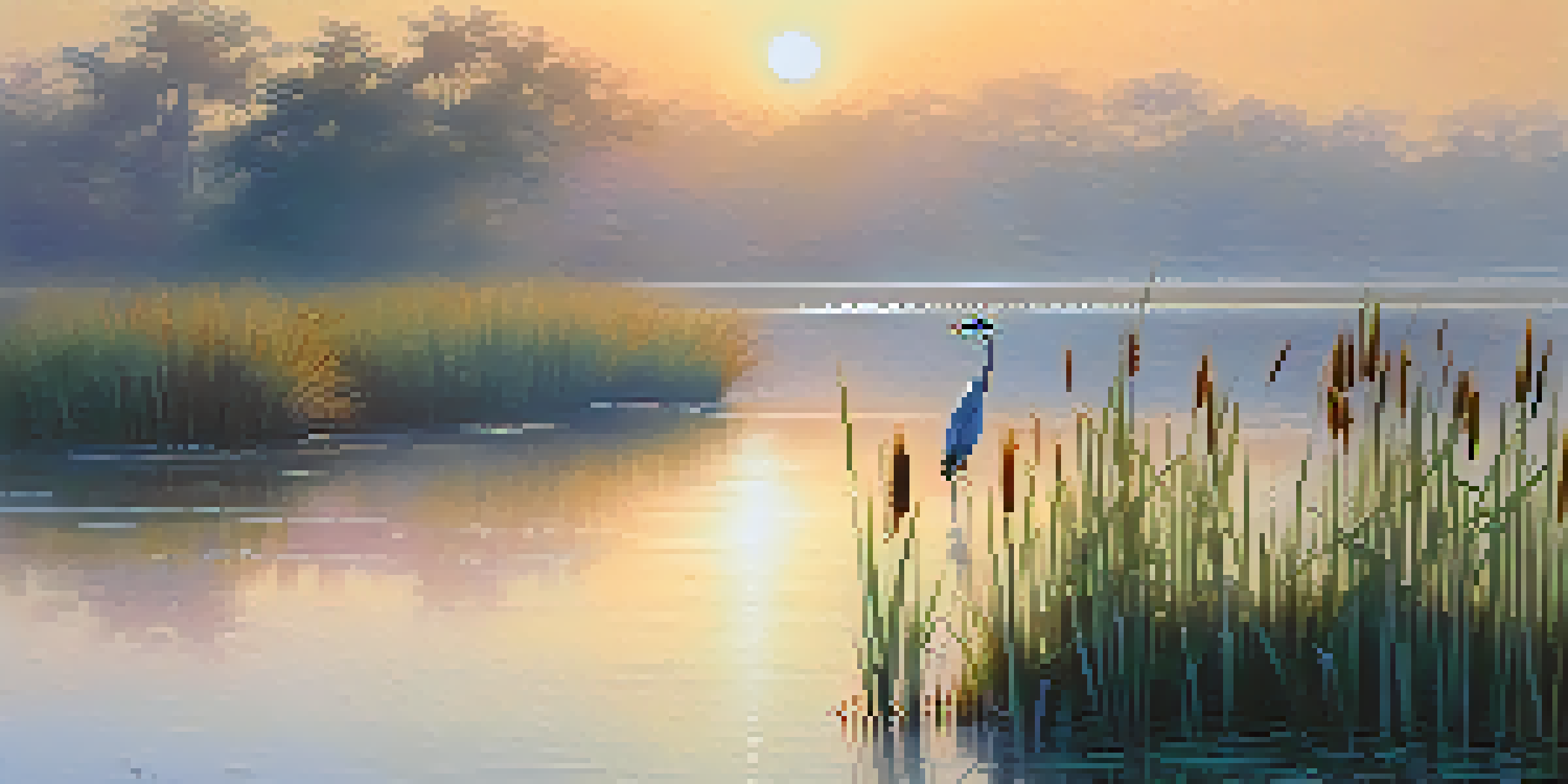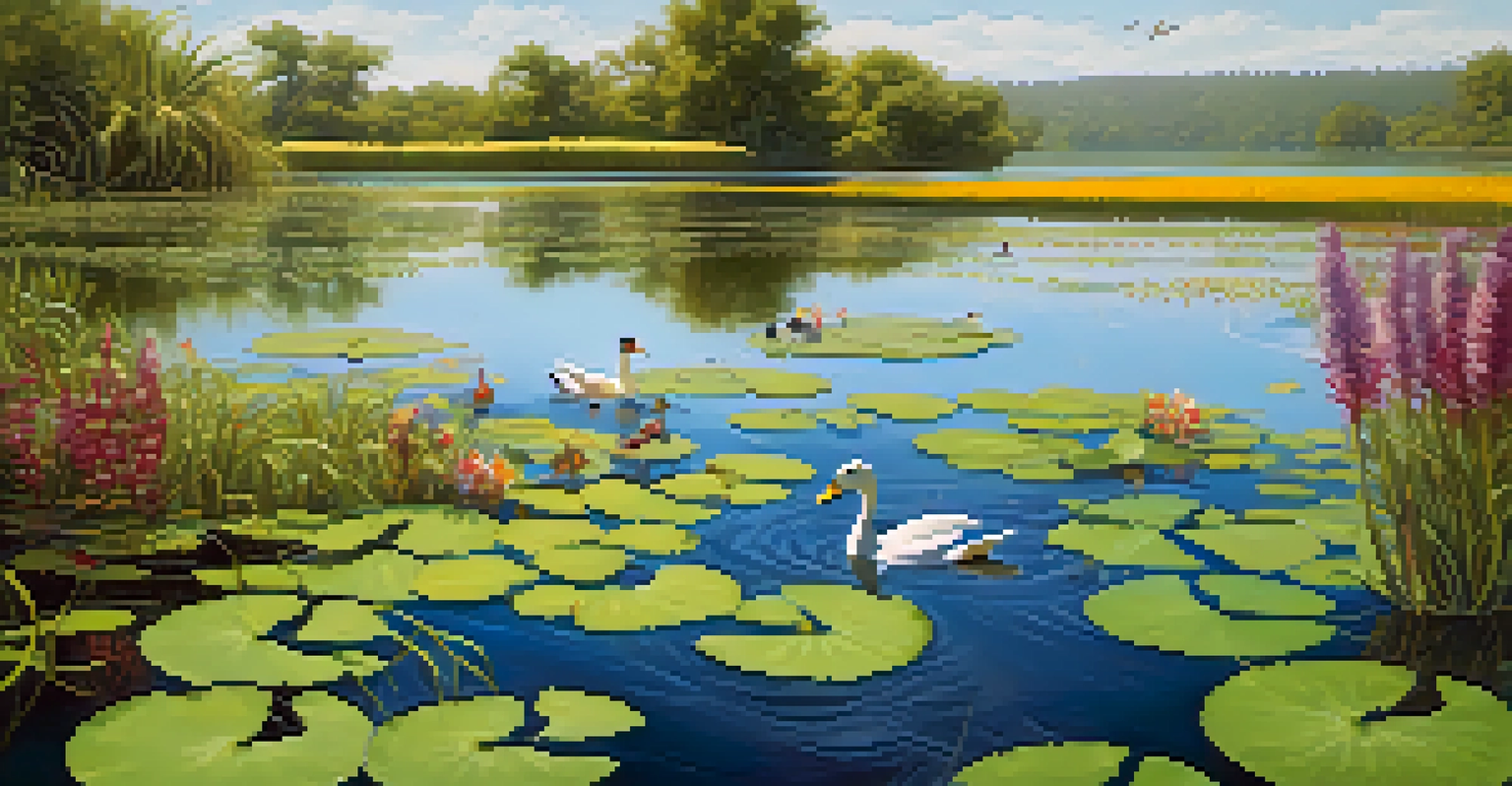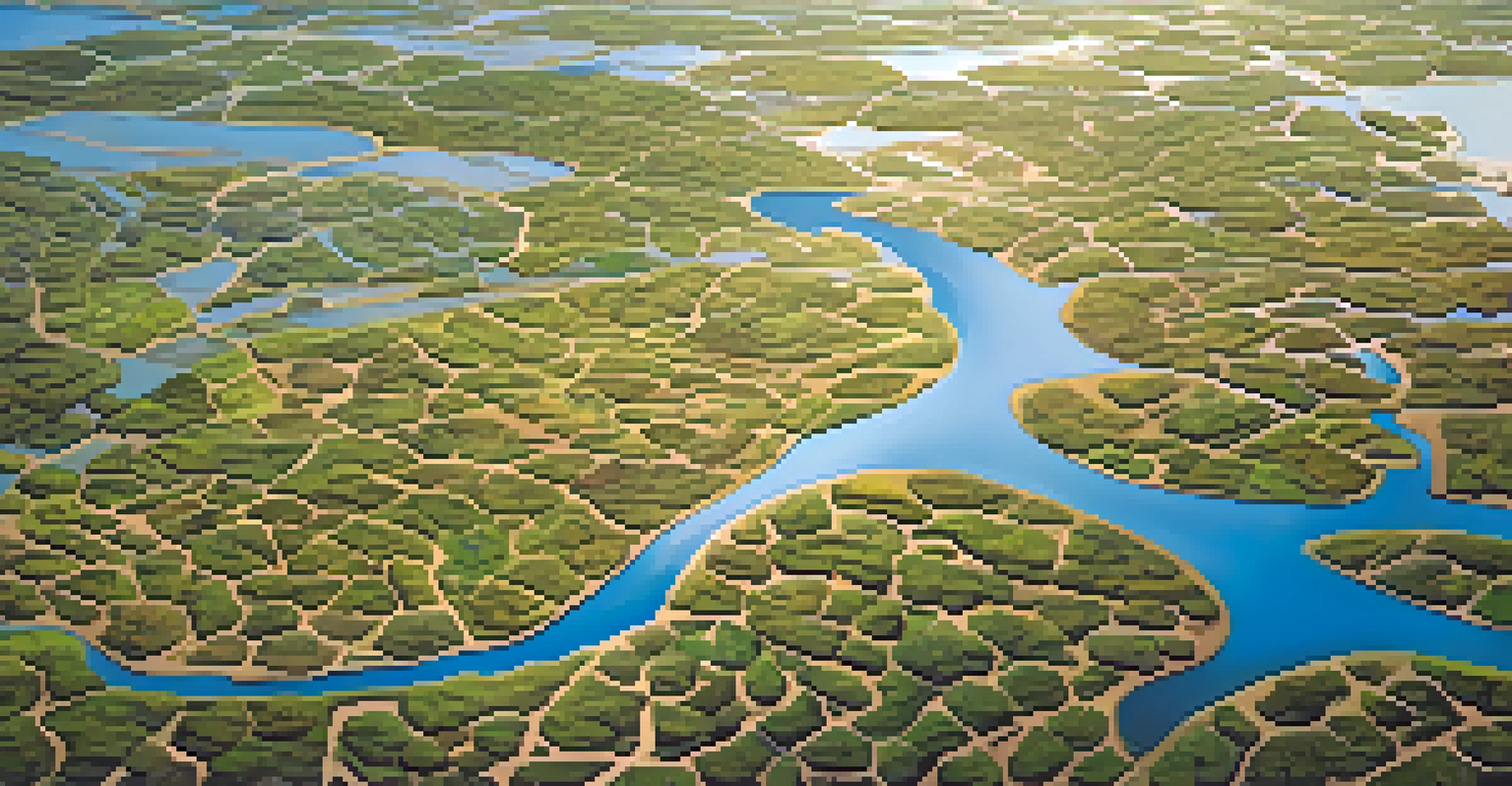The Importance of Wetlands in Savannah's Ecosystem Balance

What Are Wetlands and Why Are They Important?
Wetlands are unique ecosystems where land meets water, creating a rich habitat teeming with life. These areas can range from marshes and swamps to bogs and estuaries, each playing a crucial role in maintaining ecological balance. By storing water and filtering pollutants, wetlands act as nature's sponges, absorbing excess rainfall and reducing flood risks in Savannah.
Wetlands are among the most productive ecosystems in the world, providing essential services to both people and wildlife.
In addition to their flood control capabilities, wetlands are vital for biodiversity. They provide a home for countless species, including birds, fish, and amphibians, many of which rely on these habitats for survival. For instance, migratory birds often stop at Savannah's wetlands during their long journeys, showcasing the importance of these areas for wildlife conservation.
Moreover, wetlands contribute to the overall health of the environment by improving water quality. They trap sediments and break down harmful chemicals, ensuring that the water that flows into rivers and oceans is cleaner. This natural filtration process is essential for maintaining the delicate balance of Savannah's ecosystem.
Wetlands as Natural Flood Defenders
Savannah is no stranger to heavy rainfall, making wetlands crucial for flood prevention. These ecosystems act like a sponge, absorbing excess water during storms and slowly releasing it afterwards, which helps to mitigate flooding. This natural process not only protects nearby communities but also preserves the integrity of local wildlife habitats.

By acting as flood buffers, wetlands reduce the risk of property damage and infrastructure loss. A well-functioning wetland can lower peak flood levels, allowing for a smoother transition of water flow during heavy rains. This is particularly important in Savannah, where urban development has increased impervious surfaces like roads and buildings, making flooding more likely.
Wetlands Are Vital Ecosystems
Wetlands provide essential services such as flood control, water quality improvement, and habitat for diverse wildlife.
In addition, the presence of wetlands can lessen the impact of storm surges during hurricanes or tropical storms. Their unique structure helps to absorb energy from rising waters, providing an essential layer of protection for coastal areas. Thus, wetlands are not just beautiful landscapes; they are vital guardians of both nature and communities.
The Role of Wetlands in Water Quality Improvement
Wetlands serve as natural filters, improving water quality by removing pollutants and excess nutrients from incoming water. This filtering process is especially critical in urban areas like Savannah, where runoff from streets and industrial sites can introduce harmful substances into waterways. By capturing and breaking down these pollutants, wetlands help maintain a healthier ecosystem.
The health of our rivers, lakes, and wetlands is directly tied to the health of our communities.
Additionally, wetlands can act as a buffer against nutrient overload, which can lead to issues like algal blooms in nearby rivers and lakes. These blooms can deplete oxygen levels in the water, harming fish and other aquatic life. By absorbing excess nutrients such as nitrogen and phosphorus, wetlands play a significant role in preventing these harmful events.
Moreover, the presence of healthy wetlands contributes to the overall balance of Savannah's ecosystem. Clean water supports diverse plant and animal life, which in turn sustains the food web. By preserving and restoring wetlands, we ensure a healthier environment for all living things in the region.
Wetlands and Biodiversity: A Sanctuary for Wildlife
Savannah's wetlands are a haven for biodiversity, providing essential habitats for a wide variety of species. From the vibrant herons and egrets to the elusive otters and turtles, these areas support life at every level of the food chain. The complex interplay of different plants and animals creates a thriving community that is crucial for ecological stability.
Wetlands also serve as breeding grounds for many fish and amphibian species. For example, the shallow waters and abundant vegetation provide safe spaces for young fish to grow and thrive away from predators. This natural nursery effect is vital for sustaining fish populations that are important for both the ecosystem and local fisheries.
Threats to Wetlands Are Growing
Urban development, pollution, and climate change pose significant risks to the health and sustainability of Savannah's wetlands.
Moreover, the variety of vegetation found in wetlands, such as reeds, sedges, and cattails, offers food and shelter for numerous insects and other small creatures. These organisms play a key role in the ecosystem, acting as pollinators and serving as a food source for larger animals. The rich biodiversity of wetlands is a testament to their importance in supporting life.
Cultural Significance of Wetlands in Savannah
Beyond their ecological benefits, Savannah's wetlands hold cultural significance for local communities. Many Indigenous tribes historically relied on these areas for food, medicine, and materials, showcasing the deep connection between people and nature. Today, these traditions continue as communities work to preserve and honor the wetlands' importance.
Wetlands also contribute to the recreational opportunities that attract residents and tourists alike. Activities such as birdwatching, kayaking, and photography draw people to these natural spaces, fostering appreciation for the environment. This engagement can help raise awareness about the need to protect and restore wetland areas.
Furthermore, wetlands play a role in local art and literature, inspiring countless works that reflect the beauty and complexity of these ecosystems. By highlighting their cultural significance, we can encourage more people to advocate for the conservation of Savannah's wetlands, ensuring they remain a cherished part of the community.
Threats to Wetlands: Understanding the Challenges
Despite their importance, Savannah's wetlands face numerous threats that jeopardize their health and sustainability. Urban development poses a significant risk, as construction projects often lead to the destruction or alteration of these delicate ecosystems. As cities expand, wetlands are frequently drained or filled in, leading to habitat loss and decreased biodiversity.
Pollution is another critical challenge for wetlands. Runoff from agriculture, industry, and urban areas can introduce harmful chemicals and excess nutrients into wetland systems. This pollution can disrupt the natural balance, leading to issues such as reduced water quality and harmful algal blooms that threaten aquatic life.
Conservation Efforts Are Crucial
Active restoration and community involvement are key to protecting and preserving Savannah's wetlands for future generations.
Climate change also presents a growing threat to wetlands, with rising sea levels and increased storm intensity impacting these ecosystems. As saltwater intrudes into freshwater wetlands, the delicate balance of species can be disrupted, leading to further declines in biodiversity. Addressing these challenges requires a concerted effort from communities, policymakers, and environmental organizations.
Conservation Efforts: Protecting Savannah's Wetlands
Fortunately, numerous conservation efforts are underway to protect and restore Savannah's wetlands. Local organizations, in collaboration with government agencies, are working to restore damaged wetland areas by planting native vegetation and removing invasive species. These initiatives help to revive the natural functions of wetlands, benefiting both wildlife and local communities.
Education and outreach programs are also key components of wetland conservation. By informing the public about the importance of wetlands, these programs encourage community involvement in preservation efforts. Workshops, guided tours, and volunteer opportunities help foster a sense of stewardship for these vital ecosystems.

Moreover, advocating for stronger policies and regulations to protect wetlands is crucial for their long-term sustainability. By supporting legislation that prioritizes wetland conservation, communities can ensure that these essential ecosystems are preserved for future generations. Together, we can work towards a healthier, more balanced Savannah.
The Future of Wetlands in Savannah: A Call to Action
As we look towards the future, it is essential to prioritize the protection and restoration of Savannah's wetlands. These ecosystems are not only vital for ecological balance but also for the well-being of communities that rely on them. By coming together as a community, we can make a significant impact on the preservation of these natural treasures.
Individual actions can contribute to the larger conservation movement. Simple steps, like reducing pollution, supporting local conservation organizations, and advocating for sustainable practices, can help protect wetlands. Each small effort adds up, creating a collective force for positive change.
In conclusion, wetlands are a crucial component of Savannah's ecosystem balance, and their protection is a shared responsibility. By raising awareness and taking action, we can ensure that these vibrant ecosystems continue to thrive for generations to come. Let's work together to safeguard the future of Savannah's wetlands.